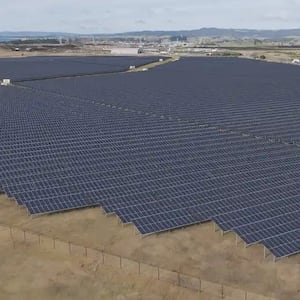
News
November 10, 2025
Meridian solar farm at Ruakākā faces challenge over ancestral land
Dr Mere Kepa says the $227m project stands on ancestral Te Parawhau land.
Ruakākā solar farm project, a $227 million venture by Meridian Energy, is facing a significant challenge due to claims it's being built on ancestral land of the Te Parawhau iwi. Dr. Mere Kepa, a prominent figure within the iwi, has voiced strong concerns, asserting that the large-scale solar farm is situated on land deeply connected to their whakapapa and cultural heritage.
The project, intended to generate renewable energy and contribute to New Zealand's sustainability goals, has now become embroiled in a dispute highlighting the complexities of balancing development with the protection of indigenous rights and cultural significance. Dr. Kepa's claims raise questions about the extent of consultation undertaken with Te Parawhau prior to the commencement of the project and whether adequate consideration was given to the potential impact on sites of historical and cultural importance.
The specific nature of the ancestral connection to the land hasn't been fully detailed, but such claims often involve burial grounds (urupā), traditional gathering places, or areas with historical significance to the iwi's identity and cultural practices. These areas hold immense spiritual value for Māori communities, and any development that disrupts or diminishes them can cause considerable distress and cultural harm.
The challenge presented by Dr. Kepa throws a spotlight on the Resource Management Act and its application concerning Māori land rights and the Treaty of Waitangi principles. The Act mandates that decision-makers consider the relationship of Māori and their culture and traditions with their ancestral lands, water, sites, waahi tapu, and other taonga. It remains to be seen how Meridian Energy and relevant authorities will respond to Dr. Kepa's concerns and whether a resolution can be reached that respects both the need for renewable energy and the cultural heritage of Te Parawhau. The situation underscores the importance of thorough and meaningful engagement with iwi throughout the planning and development process to avoid such disputes and ensure projects are culturally sensitive and sustainable in the broadest sense. Further developments are expected as discussions continue between Meridian Energy, Te Parawhau, and relevant stakeholders.
The project, intended to generate renewable energy and contribute to New Zealand's sustainability goals, has now become embroiled in a dispute highlighting the complexities of balancing development with the protection of indigenous rights and cultural significance. Dr. Kepa's claims raise questions about the extent of consultation undertaken with Te Parawhau prior to the commencement of the project and whether adequate consideration was given to the potential impact on sites of historical and cultural importance.
The specific nature of the ancestral connection to the land hasn't been fully detailed, but such claims often involve burial grounds (urupā), traditional gathering places, or areas with historical significance to the iwi's identity and cultural practices. These areas hold immense spiritual value for Māori communities, and any development that disrupts or diminishes them can cause considerable distress and cultural harm.
The challenge presented by Dr. Kepa throws a spotlight on the Resource Management Act and its application concerning Māori land rights and the Treaty of Waitangi principles. The Act mandates that decision-makers consider the relationship of Māori and their culture and traditions with their ancestral lands, water, sites, waahi tapu, and other taonga. It remains to be seen how Meridian Energy and relevant authorities will respond to Dr. Kepa's concerns and whether a resolution can be reached that respects both the need for renewable energy and the cultural heritage of Te Parawhau. The situation underscores the importance of thorough and meaningful engagement with iwi throughout the planning and development process to avoid such disputes and ensure projects are culturally sensitive and sustainable in the broadest sense. Further developments are expected as discussions continue between Meridian Energy, Te Parawhau, and relevant stakeholders.
Category:
World